8 start with R start with R
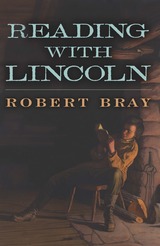
Through extensive reading and reflection, Abraham Lincoln fashioned a mind as powerfully intellectual and superlatively communicative as that of any other American political leader. Reading with Lincoln uncovers the how of Lincoln’s inspiring rise to greatness by connecting the content of his reading to the story of his life.
At the core of Lincoln’s success was his self-education, centered on his love of and appreciation for learning through books. From his early studies of grammar school handbooks and children’s classics to his interest in Shakespeare’s Macbeth and the Bible during his White House years, what Lincoln read helped to define who he was as a person and as a politician. This unique study delves into the books, pamphlets, poetry, plays, and essays that influenced Lincoln’s thoughts and actions.
Exploring in great depth and detail those readings that inspired the sixteenth president, author Robert Bray follows Lincoln’s progress closely, from the young teen composing letters for illiterate friends and neighbors to the politician who keenly employed what he read to advance his agenda. Bray analyzes Lincoln’s radical period in New Salem, during which he came under the influence of Anglo-American and French Enlightenment thinkers such as Thomas Paine, C. F. Volney, and Voltaire, and he investigates Lincoln’s appreciation of nineteenth-century lyric poetry, which he both read and wrote. Bray considers Lincoln’s fascination with science, mathematics, political economics, liberal social philosophy, theology, and the Bible, and devotes special attention to Lincoln’s enjoyment of American humor. While striving to arrive at an understanding of the role each subject played in the development of this remarkable leader, Bray also examines the connections and intertextual relations between what Lincoln read and how he wrote and spoke.
This comprehensive and long-awaited book provides fresh insight into the self-made man from the wilderness of Illinois. Bray offers a new way to approach the mind of the political artist who used his natural talent, honed by years of rhetorical study and practice, to abolish slavery and end the Civil War.
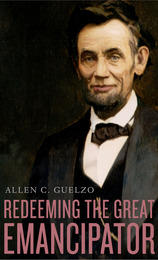
The larger-than-life image Abraham Lincoln projects across the screen of American history owes much to his role as the Great Emancipator during the Civil War. Yet this noble aspect of Lincoln’s identity is precisely the dimension that some historians have cast into doubt. In a vigorous defense of America’s sixteenth president, award-winning historian and Lincoln scholar Allen Guelzo refutes accusations of Lincoln’s racism and political opportunism, while candidly probing the follies of contemporary cynicism and the constraints of today’s unexamined faith in the liberating powers of individual autonomy.
Redeeming the Great Emancipator enumerates Lincoln’s anti-slavery credentials, showing that a deeply held belief in the God-given rights of all people steeled the president in his commitment to emancipation and his hope for racial reconciliation. Emancipation did not achieve complete freedom for American slaves, nor was Lincoln entirely above some of the racial prejudices of his time. Nevertheless, his conscience and moral convictions far outweighed political calculations in ultimately securing freedom for black Americans.
Guelzo clarifies the historical record concerning what the Emancipation Proclamation did and did not accomplish. As a policy it was imperfect, but it was far from ineffectual, as some accounts of African American self-emancipation imply. To achieve liberation required interdependence across barriers of race and status. If we fail to recognize our debt to the sacrifices and ingenuity of all the brave men and women of the past, Guelzo says, then we deny a precious part of the American and, indeed, the human community.

This is a book about politics and politicians; about elections, lawmaking, governing, and how they work. It is also about power, its increasing concentration in American society, and its implications at home and abroad especially for those who exercise it. It is a book about the Republican Party during the period in which it developed the forces and frictions which still characterize it today. Finally, it is a book about a remarkably successful and vibrant man who contained within himself much of the best and the worst of his environment, who contributed generously to American life, who knew in his time disappointment, temptation, and pain, but also glory; a man remembered most by his intimates for the “fun of him.”
The author is in an enviable position to assess these matters. During five years as Associate Editor of The Letters of Theodore Roosevelt, he read and studied all TR's letters as well as all his published works, and delved deeply into the relevant literature of the period, including the vast material in the Congressional Record. From this rich store, John Morton Blum has drawn a new interpretation of Roosevelt the conservative, Roosevelt the professional Republican politician and Roosevelt the leader of men. He presents new material on Roosevelt's work as the manager of the Republican Party and as manager of Congress. He relates Roosevelt's roles in these situations to his conduct of foreign policy—a foreign policy so anticipatory of that of contemporary America—and to his Progressiveness—a doctrine of government with strong affinities to both the New Deal and the New Crusade.

The first full account of the relationship between George Washington and Thomas Jefferson, countering the legend of their enmity while drawing vital historical lessons from the differences that arose between them.
Martha Washington’s worst memory was the death of her husband. Her second worst was Thomas Jefferson’s awkward visit to pay his respects subsequently. Indeed, by the time George Washington had died in 1799, the two founders were estranged. But that estrangement has obscured the fact that for most of their thirty-year acquaintance they enjoyed a productive relationship. Precisely because they shared so much, their disagreements have something important to teach us.
In constitutional design, for instance: Whereas Washington believed in the rule of traditional elites like the Virginia gentry, Jefferson preferred what we would call a meritocratic approach, by which elites would be elected on the basis of education and skills. And while Washington emphasized a need for strong central government, Jefferson favored diffusion of power across the states. Still, as Francis Cogliano argues, common convictions equally defined their relationship: a passion for American independence and republican government, as well as a commitment to westward expansion and the power of commerce. They also both evolved a skeptical view of slavery, eventually growing to question the institution, even as they took only limited steps to abolish it.
What remains fascinating is that the differences between the two statesmen mirrored key political fissures of the early United States, as the unity of revolutionary zeal gave way to competing visions for the new nation. A Revolutionary Friendship brilliantly captures the dramatic, challenging, and poignant reality that there was no single founding ideal—only compromise between friends and sometime rivals.
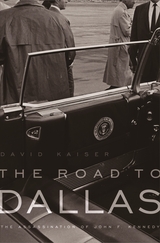
Neither a random event nor the act of a lone madman—the assassination of President John F. Kennedy was an appalling and grisly conspiracy. This is the unvarnished story.
With deft investigative skill, David Kaiser shows that the events of November 22, 1963, cannot be understood without fully grasping the two larger stories of which they were a part: the U.S. government’s campaign against organized crime, which began in the late 1950s and accelerated dramatically under Robert Kennedy; and the furtive quest of two administrations—along with a cadre of private interest groups—to eliminate Fidel Castro.
The seeds of conspiracy go back to the Eisenhower administration, which recruited top mobsters in a series of plots to assassinate the Cuban leader. The CIA created a secretive environment in which illicit networks were allowed to expand in dangerous directions. The agency’s links with the Mafia continued in the Kennedy administration, although the President and his closest advisors—engaged in their own efforts to overthrow Castro—thought this skullduggery had ended. Meanwhile, Cuban exiles, right-wing businessmen, and hard-line anti-Communists established ties with virtually anyone deemed capable of taking out the Cuban premier. Inevitably those ties included the mob.
The conspiracy to kill JFK took shape in response to Robert Kennedy’s relentless attacks on organized crime—legal vendettas that often went well beyond the normal practices of law enforcement. Pushed to the wall, mob leaders merely had to look to the networks already in place for a solution. They found it in Lee Harvey Oswald—the ideal character to enact their desperate revenge against the Kennedys.
Comprehensive, detailed, and informed by original sources, The Road to Dallas adds surprising new material to every aspect of the case. It brings to light the complete, frequently shocking, story of the JFK assassination and its aftermath.
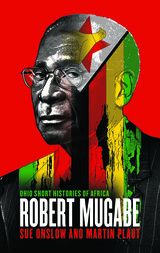
Zimbabwe’s President Robert Mugabe sharply divides opinion and embodies the contradictions of his country’s history and political culture. As a symbol of African liberation and a stalwart opponent of white rule, he was respected and revered by many. This heroic status contrasted sharply, in the eyes of his rivals and victims, with repeated cycles of gross human rights violations. Mugabe presided over the destruction of a vibrant society, capital flight, and mass emigration precipitated by the policies of his government, resulting in his demonic image in Western media.
This timely biography addresses the coup, led by some of Mugabe’s closest associates, that forced his resignation after thirty-seven years in power. Sue Onslow and Martin Plaut explain Mugabe’s formative experiences as a child and young man; his role as an admired Afro-nationalist leader in the struggle against white settler rule; and his evolution into a political manipulator and survivalist. They also address the emergence of political opposition to his leadership and the uneasy period of coalition government. Ultimately, they reveal the complexity of the man who stamped his personality on Zimbabwe’s first four decades of independence.
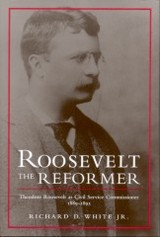
Roosevelt the Reformer sheds light on an important chapter in the biography of the flamboyant 26th president of the United States. From 1889 to 1895—before he was a Rough Rider in the Spanish–American War and before he oversaw the building of the Panama Canal and won the 1906 Nobel Peace Prize—“Teddy” Roosevelt served as one of three civil service commissioners. This was a significant period of his life because he matured politically and learned how to navigate through Washington politics. He sparred with powerful cabinet officers and congressmen and survived their attempts to destroy him. He cultivated important friendships and allegiances, flourished intellectually, and strengthened his progressive views of social justice, racial theory, and foreign relations. It was a period altogether significant to the honing of administrative talent and intellectual acuity of the future president.
Richard White Jr. situates young Roosevelt within the exciting events of the Gilded Age, the Victorian era, and the gay nineties. He describes Roosevelt's relationships with family, friends, colleagues, and adversaries. Many of these people, such as Henry Cabot Lodge, Cecil Spring-Rice, Alfred Mahan, Henry Adams, and John Hay would significantly influence Roosevelt when he later occupied the White House. White explores TR's accomplishments in civil service reform, the effect of the commission experience on his presidency a decade later, and his administrative legacy.
In addition to Harvard University’s immense collection of Roosevelt
correspondence, White drew from original sources such as the Civil Service Commission files in the National Archives, the Library of Congress, the National Park Service Roosevelt Historical Site at Sagamore Hill, and the records of the National Civil Service Reform League.
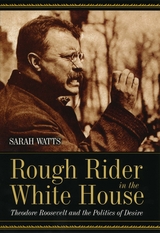
In this book, Sarah Watts probes this dark side of the Rough Rider, presenting a fascinating psychological portrait of a man whose personal obsession with masculinity profoundly influenced the fate of a nation. Drawing on his own writings and on media representations of him, Watts attributes the wide appeal of Roosevelt's style of manhood to the way it addressed the hopes and anxieties of men of his time. Like many of his contemporaries, Roosevelt struggled with what it meant to be a man in the modern era. He saw two foes within himself: a fragile weakling and a primitive beast. The weakling he punished and toughened with rigorous, manly pursuits such as hunting, horseback riding, and war. The beast he unleashed through brutal criticism of homosexuals, immigrants, pacifists, and sissies—anyone who might tarnish the nation's veneer of strength and vigor. With his unabashed paeans to violence and aggressive politics, Roosevelt ultimately offered American men a chance to project their longings and fears onto the nation and its policies. In this way he harnessed the primitive energy of men's desires to propel the march of American civilization—over the bodies of anyone who might stand in its way.
Written with passion and precision, this powerful revisioning of an American icon will forever alter the way we see Theodore Roosevelt and his political legacy.
"A superb scholarly study of how Roosevelt built his political base on the aspiration and fears of men in a rapidly changing nation and world."—Charles K. Piehl, Library Journal
"A thought-provoking and innovative study of the dark side of Roosevelt's personality. . . . [Watt's] arguments are clear, passionate, and thoroughly supported."—Elizabeth A. Bennion, Journal of Interdisciplinary History
READERS
Browse our collection.
PUBLISHERS
See BiblioVault's publisher services.
STUDENT SERVICES
Files for college accessibility offices.
UChicago Accessibility Resources
home | accessibility | search | about | contact us
BiblioVault ® 2001 - 2024
The University of Chicago Press









